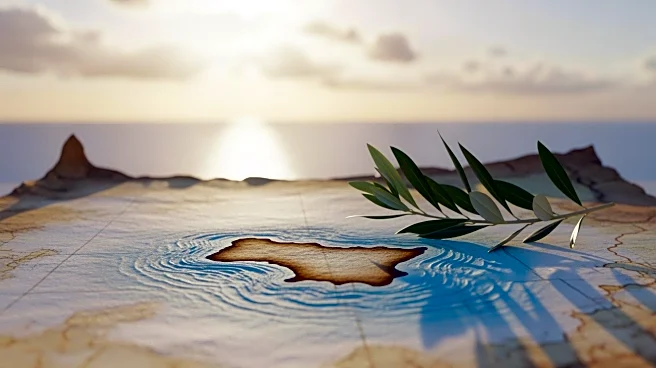What's Happening?
The concept of self-determination has been a significant force in global human rights movements over the past 150 years. The United Nations Resolution 1514 enshrined self-determination as a human right,
emphasizing its importance beyond geopolitical debates. Historically, U.S. President Woodrow Wilson advocated for self-determination post-World War I, although initially limited to European ethnic groups. The League of Nations attempted to implement these ideas, but they were constrained by racial biases and colonial interests. Over time, the international community has worked to refine self-determination principles, acknowledging the colonial histories of territories like Guahan. Despite the UN's inability to enforce its rules in Guahan, the push for self-determination remains a powerful, unstoppable force. The article suggests that a future U.S. president might invite the UN to review progress in Guahan, aligning with the broader commitment to a free and open Indo-Pacific.
Why It's Important?
The issue of self-determination is crucial for territories like Guahan, which have historically been subjected to external domination. Recognizing self-determination as a human right underscores the importance of autonomy and dignity for these regions. The broader implications include potential shifts in international relations and policy, particularly in the Indo-Pacific region. As global dynamics evolve, the recognition and implementation of self-determination could influence geopolitical strategies, especially concerning major powers like China and the U.S. The ongoing dialogue around self-determination also highlights the need for historical accountability and the dismantling of colonial legacies, which could lead to more equitable international systems.
What's Next?
While the UN cannot enforce self-determination in Guahan, the trajectory of human history suggests increasing international support for such movements. Future U.S. administrations may face pressure to address self-determination more directly, potentially inviting international reviews or engaging in diplomatic discussions. The evolving geopolitical landscape, particularly in the Indo-Pacific, may necessitate new strategies that prioritize human rights and self-determination. Stakeholders, including political leaders and civil society groups, may advocate for more robust frameworks to support these principles, influencing policy decisions and international relations.
Beyond the Headlines
The push for self-determination in Guahan and similar territories raises ethical questions about historical injustices and the legacy of colonialism. It challenges existing power structures and calls for a reevaluation of international norms and practices. The movement also intersects with other global issues, such as climate change and human rights, suggesting a broader shift towards more inclusive and equitable global governance. As self-determination gains traction, it may inspire other regions to pursue similar paths, potentially reshaping international alliances and priorities.









